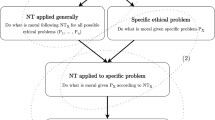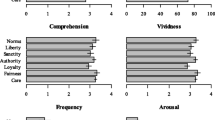Abstract
In Section 1, I rehearse some arguments for the claim that morality should be ``action-guiding', and try to state the conditions under which a moral theory is in fact action-guiding. I conclude that only agents who are cognitively and conatively ``ideal' are in general able to use a moral theory as a guide to action. In Sections 2 and 3, I discuss whether moral ``actualism' implies that morality cannot be action-guiding even for ideal agents. If actualism is true, an ideal agent will know about her own future actions. Since such foreknowledge is often thought to be incompatible with deliberation, and since action-guidance presupposes the possibility of deliberation, there is an apparent difficulty in combining actualism with the requirement of action-guidance. In opposition to an argument by Jan Österberg, I try to show that actualism and action-guidance are in fact compatible.
Similar content being viewed by others
REFERENCES
Bergström, Lars: 1977, 'Utilitarianism and Future Mistakes', Theoria 43, 84-102.
Bergström, Lars: 1996, 'Reflections on Consequentialism', Theoria 62, 74-94.
Brink, David O.: 1989, Moral Realism and the Foundations of Ethics, Cambridge University Press, Cambridge.
Bykvist, Krister: 2000, 'Time-Partial Morality and Dynamic Choice', in W. Rabinowicz (ed.), Value and Choice, Department of Philosophy, Lund University, Lund, pp. 53-64.
Carlson, Erik: 1995, Consequentialism Reconsidered, Kluwer Academic Publishers, Dordrecht.
Carlson, Erik: 1999, 'Consequentialism, Alternatives, and Actualism', Philosophical Studies 96, 253-268.
Feldman, Fred: 1986, Doing the Best We Can, D. Reidel Publishing Company, Dordrecht.
Ginet, Carl: 1962, 'Can the Will Be Caused?', The Philosophical Review 71, 49-55.
Goldman, Alvin I.: 1970, A Theory of Human Action, Princeton University Press, Princeton, NJ.
Goldman, Holly S.: 1976, 'Dated Rightness and Moral Imperfection', The Philosophical Review 85, 449-487.
Goldman, Holly S.: 1978, 'Doing the Best One Can', in A. I. Goldman and J. Kim (eds.), Values and Morals, D. Reidel Publishing Company, Dordrecht, pp. 185-214.
Greenspan, Patricia S.: 1978, 'Oughts and Determinism: A Response to Goldman', The Philosophical Review 87, 77-83.
Humberstone, I. Lloyd: 1983, 'The Background of Circumstances', Pacific Philosophical Quarterly 64, 19-34.
Jackson, Frank and Robert Pargetter: 1986, 'Oughts, Options, and Actualism', The Philosophical Review 95, 233-255.
Levi, Isaac: 1997, 'Consequentialism and Sequential Choice', in The Covenant of Reason, Cambridge University Press, Cambridge, pp. 70-101.
Moore, G. E.: 1903, Principia Ethica, Cambridge University Press, Cambridge.
Österberg, Jan: 1998, 'A Problem for Consequentialism', in L. Lindahl, J. Odelstad and R. Sliwinski (eds.), Not Without Cause, Department of Philosophy, Uppsala University, Uppsala, pp. 278-283.
Parfit, Derek: 1986, Reasons and Persons, Oxford University Press, Oxford.
Railton, Peter: 1988, 'Alienation, Consequentialism, and the Demands of Morality', in S. Scheffler (ed.), Consequentialism and its Critics, Oxford University Press, Oxford, pp. 93-133.
Schick, Frederic: 1988, 'Self-Knowledge, Uncertainty, and Choice', in P. Gärdenfors and N.-E. Sahlin (eds.), Decision, Probability, and Utility, Cambridge University Press, Cambridge, pp. 270-286.
Smith, Holly M.: 1986, 'Moral Realism, Moral Conflict, and Compound Acts', The Journal of Philosophy 83, 341-345.
Smith, Holly M.: 1988, 'Making Moral Decisions', Noûs 22, 89-108.
Smith, Holly M.: 1989-90, 'Two-Tier Moral Codes', Social Philosophy & Policy 7, 112-132.
Sobel, Jordan Howard: 1976, 'Utilitarianism and Past and FutureMistakes', Noûs 10, 195-219.
Sobel, Jordan Howard: 1982, 'Utilitarian Principles for Imperfect Agents', Theoria 48, 113-126.
Spohn, Wolfgang: 1977, 'Where Luce and Krantz Do Really Generalize Savage's Decision Model', Erkenntnis 11, 113-134.
Taylor, Richard: 1966, Action and Purpose, Prentice-Hall, Englewood Cliffs, NJ.
Thomason, R. H.: 1981, 'Deontic Logic and the Role of Freedom in Moral Deliberation', in R. Hilpinen (ed.), New Studies in Deontic Logic, D. Reidel Publishing Company, Dordrecht, pp. 177-186.
Waller, Bruce N.: 1985, 'Deliberating About the Inevitable', Analysis 45, 48-52.
Zimmerman, Michael J.: 1996, The Concept of Moral Obligation, Cambridge University Press, Cambridge.
Author information
Authors and Affiliations
Rights and permissions
About this article
Cite this article
Carlson, E. Deliberation, Foreknowledge, and Morality as a Guide to Action. Erkenntnis 57, 71–89 (2002). https://doi.org/10.1023/A:1020146102680
Issue Date:
DOI: https://doi.org/10.1023/A:1020146102680




